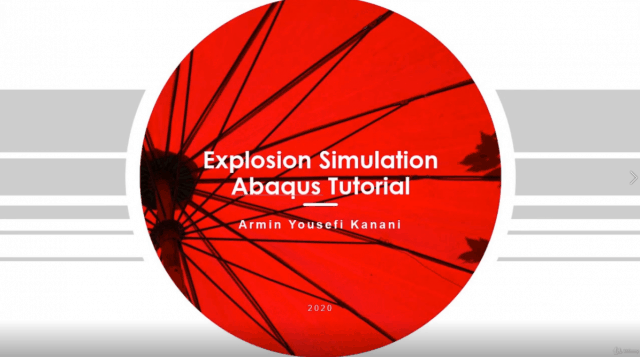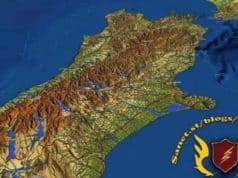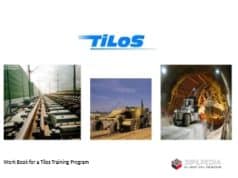Explosion Simulation in Abaqus using Air blast, Acoustic, Coupled Eulerian-Lagrangian, and SPH
What you’ll learn:
Simulating Explosion in Abaqus
Air blast explosion
Smoothed particle hydrodynamics (SPH) explosion method
Coupled Eulerian-Lagrangian (CEL) explosion explosion method
UNDEX charge
Various damage model such: Concrete damage plasticity (CDP), Johnson-cook, Johnson-Holmquist, Hasin damage model, ductile and shear damage model
Requirements
Abaqus Software (Version 6.14.1 were used for this course)
Basic knowledge of the software
Engineering background
Description
Welcome to the Explosion Simulation Abaqus Tutorial, the only course you need to learn how to simulate various explosion condition on different applications. This course is specially designed for mechanical, civil engineering students or engineers who want to expand their finite element knowledge. This course will teach you the theory behind input parameters as well as modelling and analysing the results.
What you will get in this course:
**This Course is the divided into the 4 sections and in order to get the most advantage of it, we highly recommend you to follow the course in order as the basic terms have been only explained in the initial sections.
Section 1: Air-blast
This section aims to teach you how to use the CONWEP model for air-blast loading on solid and structural elements, without the need to model the fluid medium. Four real-life examples plus four theory videos have been used for this section to teach you how to model explosion on the concrete structure using concrete damaged plasticity (CDP) and Johnson-Holmquist model. Moreover, you can familiarize yourself with Hasin and Johnson-cook damage model in the explosion on the car door and the composite beam examples.
**Please do not miss the section 1 as all material theories have been explained only here.
Section 2: Smoothed particle hydrodynamics (SPH) explosion method
This section aims to teach you how to use the Smoothed particle hydrodynamics (SPH). This numerical method is part of the larger family of meshless (or mesh-free) methods where we are using only a collection of points to represent a given body rather than the usual method. Here, you will make yourself familiarize with SPH explosion method on the concrete beam and water-tank. Moreover, two examples of bird-strike on the fuselage and jet engine can help you to understand the other usage of this useful method. Finally, the bullet examples will teach you how to model gunpowder explosion in the bullet shell.
Section 3: Coupled Eulerian-Lagrangian (CEL) method
This section aims to teach you how to combines two mesh approaches-Lagrangian and Eulerian-in the same analysis. The purpose of this technique is to avoid mesh problems when performing simulations that involve high/extreme deformations. This section contains four examples which the first three examples help you to simulate various explosion condition on different structures (Such as concrete beam, under-ground pipeline and only soil) and the fourth examples help you find the other usage of this method by simulating the bird strike on the aeroplane wing.
Section 4: Underwater explosion (UNDEX)
This section aims to teach you how to simulate the underwater explosion. Here, waves produced by an explosion or sound source propagate from the source, impinging on and passing over the structure, producing a temporally and spatially varying load on the structural surface. This section helps you to understand UNDEX charge method and also how to use ductile and shear damage model in Abaqus by simulating under water explosion on submarine and ship structure.
| Pembicara | : Arfi Yousefi Kanani |
| Bahasa | : English |
| Format | : .mp4 |
| Durasi | : 09:10:00 |
| Ukuran | : 5.6 GB |
Download








tombol downloadnya tidak bisa
silahkan login dulu sebagai premium membership